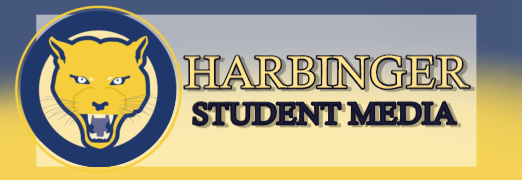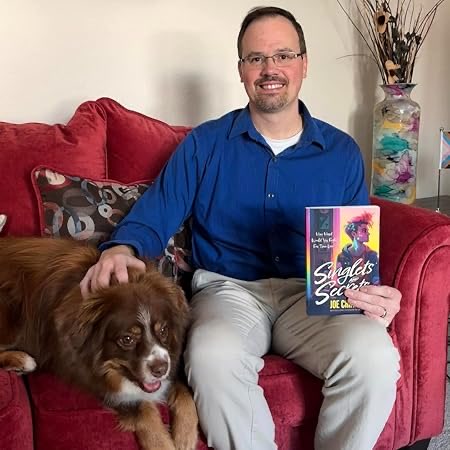One ICC Professor Makes it His Mission to Expand Queer Representation
Current legislation in Florida and other states prevents the discussion of the LGBTQ+ community in schools, so author Joe Chianakas has made it his purpose to write stories about queer students and their lives.
Chianakas, who is also a professor of communication at ICC, has written a book series about this topic. His first book “Singlets and Secrets” was published in 2023, while his second book “Pride and Persistence” came out this August. Chianakas’s book follows a gay teenager, Aidan, and his friends as they try to navigate a school that will not allow them to express themselves.
If students wish to meet professor Chianakas, he will be at ICC’s National Coming Out Day event on October 10th, from 1:30 p.m. to 2:30 p.m. at the EP Academic Building, in room 212C.
This interview has been edited for clarity and length.
Essie Newton
What is your book “Pride and Persistence” about?
Joe Chianakas
“Pride and Persistence” is the sequel to “Singlets and Secrets.” It’s the second book in the “Unveiling Aidan” series. It can be kind of a standalone as well. It’s just a better read with the first one. But it starts with our main character having a boyfriend. So I’m going to look at this from probably at least three major angles.
One was to try to show an authentic, queer teenage relationship with all the ups and downs, the insecurities, the questions they may have. It’s meant to be hopefully very heartwarming at times but also very emotional at times and sad at times. I like getting to show that.
The second angle was to show a group of teenagers who are fighting back against a school’s “don’t say gay” policies. A lot of the state legislation that was happening in Florida at the time inspired me to take a look at what the consequences of this will be and make a whole story out of it. And also serve as a warning, to be honest about what might happen if we take some steps back and allow some of those laws to take place. If you don’t have parents who are supportive, then school is the only place you might find an audience or find someone.
The love story and the social justice pushback is framed in a martial arts drama. There is going to be a mixed martial arts tournament where these two anti-LGBTQ coaches create a team to go against our queer karate team. Not that they were necessarily labeled as the queer karate team, but it was meant to be a place for outsiders.
There’s going to be a new challenge and it’s a $25,000 scholarship prize to the winner. So here’s this huge tournament kind of in the background that they’ve got to prepare for at the same time. The theme is “What are we fighting for if not each other?”.
I’m trying to really make my good guys do some bad things, my bad guys do some good things, and really trying to have a good blend of that to get us ultimately to realize, “Why am I fighting someone who should be my friend?”. That’s hopefully the message that comes out by the end.
EN: You said that you wanted to make this about when you heard about the legislation in Florida and all the other states that have had really strict laws against talking about the queer community. Are there any personal connections to this?
JC: Oh, absolutely. So the whole series is related to, if you want to call it this, my queer karate kid story. When I was a kid, I turned to martial arts. So that’s why martial arts is the story and the background, because you should write what you know.
I love stories like “The Karate Kid” and “Rocky,” where you have got the underdog who trains to take down the champ. My problem with the stories of the past is that they’re not representative of the LGBTQIA+ community.
So specifically, my little inner geek fell in love with “Cobra Kai.” I am a super fan. But I told the creators that the problem with the story is, you missed an opportunity. Why not have these wildly entertaining storylines also be inclusive and why not have a queer hero?
They [the creators] have got dozens of these teenage martial artists and not a single one of them identifies or talks about queerness. This is a missed opportunity, a failed opportunity I would argue. So I decided to write the story that I think should be written.
EN: Obviously, it seems that your books and your motivations are mostly around sexuality and being able to express yourself. What about genders like being transgender or just being out the binary, is that in your book?
JC: In “Pride and Persistence,” we introduce a new transgender character, Michelle, she is a transgender black belt, right in the very beginning. I want to be as inclusive as possible, but I also want to be very careful about how I write some other story or how I write in other points of view, when I am not that particular person.
In “Pride and Persistence” specifically, we have someone who comes out as bisexual, we have multiple queer characters, we have a transgender character, and we have non-binary characters, they just haven’t come out yet. They come out in book three.
I don’t think everything happens overnight. I’m just trying to make it as natural as possible. Because growth, I think, takes time to figure that stuff out.
EN: If you could redo the first book and try to get more representation in there, would you?
JC: That’s a great question, I’m not really sure if I would want to. The first book is told from a first-person point of view. I went into “Singlets and Secrets” with a very specific mission, and I wanted to tell the best story I could without cluttering it. What I really wanted to do was that deep dive into one kid’s head.
“Pride and Persistence” becomes about more peoples’ story, and it expands from there. In fact, I ended book three with Aiden, my main character, saying, “This is no longer just my story, and it is no longer just my words that matter.”
I just signed a contract to do a fourth book. In this book, I want multiple points of view. I want to have the transgender point of view, the non-binary point of view, the bisexual point of view, the lesbian point of view, because other people matter.
I am a cisgender white male, who’s gay. Really gross comments come at me, and I’ve already got privilege in my favor. It can be so much harder for people of color, for women, for trans and non-binary people, it can be so much more challenging, and they can receive so much more criticism and gross comments. But I’ve already told Aiden’s story, so now I want to open it up.
I had a horror series before this that had mostly straight characters. I was playing it safe.
If you ask me this question: “Do you regret not having a lot of queer characters in ‘Rabbit and Red?’” Yes, but I was still trying to figure out how to write and how to tell a story. Then as I started writing those stories, I realized that stories have opportunities not only to entertain, but to represent, to inspire, to make some positive change.
So I have a new horror novel coming out next year that is very much queer representative, and this is who I am going to be from this point moving forward.
EN: You intend to represent queer audiences. Is there any other audience you have in mind?
JC: I want there to be a character for everyone. This is a book for parents, this is a book for teachers, this is a book for allies, and all of our friends.
I have a tremendous amount of parents reading this book. My straight readers who are strong allies, and have always supported people like us, have said to me, “I had no idea that this was something you thought about or had to experience or had a struggle with.”
That’s the message that I’ve been pushing when I promote it is that it’s not just for teens and young adults.
I had that “foot in the door” technique to queerness. Aidan has a girlfriend when this story opens up. He’s not out. It’s a very easy thing for a straight person to start reading and then be like, oh, what’s happening here? And then he [Aiden] comes out. And then it’s a domino effect and you realize it’s not just one person, it’s hundreds.
EN: Is there anything else you want to add?
JC: Whether it’s my story or others, the biggest thing I want people to know is that I hope people support diverse art and I hope people create diverse art. We need fresh perspectives and fresh stories.
I am hoping for this to be a point in my career where it’s not even about me, but that I’ve accomplished enough that I get to hold the door open for the next generation. That’s what I want people to do, because you have to tell your story, you have to create your art, and if I can break down some barriers and open some doors for people, then that’s my purpose here.
My purpose is to be successful enough to pass the torch.

